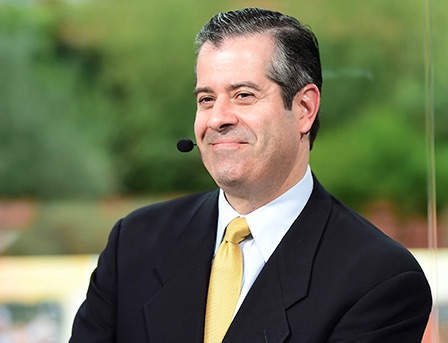The Five Spot: Alvaro Martin

The smarter way to stay on top of broadcasting and cable industry. Sign up below
You are now subscribed
Your newsletter sign-up was successful
On Sunday, ESPN Deportes will air its first Super Bowl telecast live from Levi’s Stadium in Santa Clara, Calif. On the call will be Alvaro Martin, 53, providing the play-by-play with analyst Raul Allegre and sideline reporter John Sutcliffe. Martin, who joined ESPN in 1991 as the network’s first announcer for two languages, will be calling his 18th Super Bowl. The previous games were for the international side of ESPN. A native of San Juan, Puerto Rico, Martin covers the NFL as the play-by-play voice for Monday Night Football and analyst for NFL Semanal. In addition to his role covering the NBA, Martin has called Major League Baseball and NCAA basketball games in English and was the first sideline reporter for ESPN’s Sunday Night Baseball. An edited version of Martin’s conversation with B&C’s Jonathan Kuperberg follows.
How did you get into broadcasting?
I remember listening to Armed Forces Radio. There were also a couple of Navy bases that had radio stations. I [did] my homework Sunday afternoons and evenings, listening to games. That was a thrill. I worked at my college radio station. I didn’t do sports; I became the folk radio head. I learned the notion of communication, connecting with an audience. [Later], I branched off to do consulting. One client was ESPN International. [Former ESPN chairman/ president/CEO] Steve Bornstein looked at my resumé and kept asking me about the radio station in college. He encouraged me to look around. At one point I sat in on a college football game. The guy next to me takes out an index card and says, ‘We have Alvaro Martin here. Give your thoughts on the first half.’ That was my debut.
What is your favorite sport to announce?
Do you have a favorite child? They all have their own dynamic, beauty and attraction, and I’m not going to put one over the next.
What was a memorable on-air call you made?
None in the league of, ‘Do you believe in miracles?’ I don’t strive to do that. Lately, one that made the rounds on Deadspin was when Brandon McManus missed a field goal that would have given his team [the Broncos] a win. I couldn’t help myself. Kicking in Denver, there’s no excuse—45 yards is like a 36-yarder anywhere else. I exclaimed, ‘Nooo!’ I didn’t say it with any specific tone that communicated disappointment or mocking his mistake. Simply, I couldn’t believe this guy missed it.
The smarter way to stay on top of broadcasting and cable industry. Sign up below
What has been your biggest challenge?
No. 1—this I already completed many years ago—was fashioning my ‘Walter Cronkite Spanish.’ I need to make Mexicans think while I’m not one of them I’m the best option, and not lose [other countries]. Fashioning this language and jargon and intonation of speech that is truly universal is not easy.
If you could change one thing about the NFL, what would it be?
If I were the commissioner, I would assign five countries to each team. For the next five years, in the offseason you send coaches and potentially players to become the NFL in these countries. You go every year, organize a combine, teach coaches, teach the local football association, perhaps leave behind equipment, become resources for them during the year. The only way the sport will become international is if they play it and get champions from these countries. It’s the surest, quickest and probably least expensive way to grow the sport. There’s no monopoly on talent in North America. None whatsoever.
